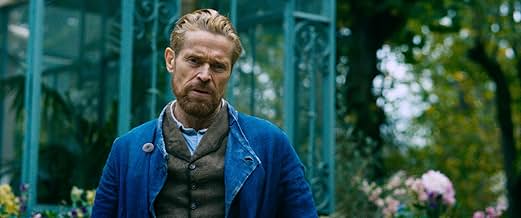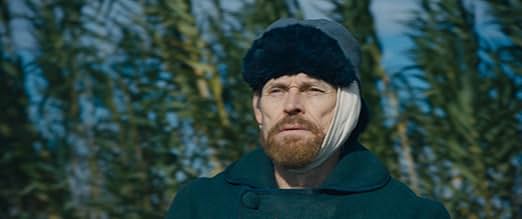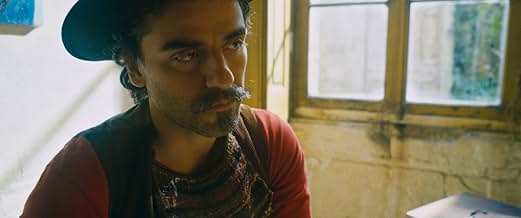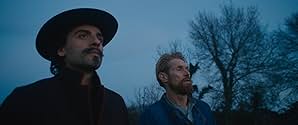A look at the life of painter Vincent van Gogh during the time he lived in Arles and Auvers-sur-Oise, France.A look at the life of painter Vincent van Gogh during the time he lived in Arles and Auvers-sur-Oise, France.A look at the life of painter Vincent van Gogh during the time he lived in Arles and Auvers-sur-Oise, France.
- Director
- Writers
- Stars
- Nominated for 1 Oscar
- 3 wins & 16 nominations total
Clément Paul Lhuaire
- Emile Bernard
- (as Clément Lhuaire)
Alan Aubert
- Albert Aurier
- (as Alan Aubert-Carlin)
- …
- Director
- Writers
- All cast & crew
- Production, box office & more at IMDbPro
Featured reviews
This film succeeds in various ways: Dafoe delivers a marvelous portrayal of van Gogh, and Rupert Friend offers a dignified performance as Theo, his brother. The production design, costuming, and lush landscapes are all outstanding. As someone who has seen most of the films directed by Schnabel, I find him an insightful, astute director, yet I wish he would have introduced more nuance into certain scenes.
The invigorating piano score suffers from an overblown volume at various times. At the pre-release screening, more than a handful of people walked out of the film, midway. I think they were overwhelmed by a dizzy combination of loud music and jumpy, blurred camera techniques. As for me, the approach worked, adding a visceral punch.
Some of the dialogue was culled from Vincent's letters to his brother, and Dafoe rendered the text with a vulnerable immediacy. Several roles were aptly cast, but could have benefited from additional screen time: Isaac (as Gauguin), Almaric (Dr. Gachet), and Seigner (Madame Ginoux).
The invigorating piano score suffers from an overblown volume at various times. At the pre-release screening, more than a handful of people walked out of the film, midway. I think they were overwhelmed by a dizzy combination of loud music and jumpy, blurred camera techniques. As for me, the approach worked, adding a visceral punch.
Some of the dialogue was culled from Vincent's letters to his brother, and Dafoe rendered the text with a vulnerable immediacy. Several roles were aptly cast, but could have benefited from additional screen time: Isaac (as Gauguin), Almaric (Dr. Gachet), and Seigner (Madame Ginoux).
AT ETERNITY'S GATE is by no stretch meant to be a pure biography of Van Gogh. I think you need to already be familiar with some of the outlines of his story and it would help to be an appreciator of his work already. What we're really seeing here is director Julian Schnabel's attempt to show us the world as seen through the eyes of Van Gogh. How did he see things and what inspired him. What drove him to madness? What frustrated him in his relations with people? How did he slip into madness (if, indeed, he did)?
Hence, there are a lot of shots of scenery seen through Van Gogh's eyes. I don't know if star Willem Dafoe had a go-pro strapped to his head, or what...but we see walking feet, we see the ground, then the sky, then the landscape...over and over. We see him painting. We see him sitting still and contemplating the land around him. If you can give yourself over to this, it is fairly effective. Instead of wondering when something will happen, just try to experience what you're seeing and hearing. You may be drawn into seeing how Van Gogh saw beauty in the rough landscape around him and how he could NOT stop from painting it in a fever of wanting to catch it before it slipped away. At the same time, these scenes teeter on the edge of tedium.
There are more conventional scenes, to be sure. We see interactions between Van Gogh and Paul Gaughin (Oscar Isaac) and an extensive conversation between Van Gogh and a priest (the excellent Mads Mikkelsen). However, these scenes are full of characters talking about how they see art and the world around them...they speak to each other in lectures. So, the dialogue is not convincing...but it IS interesting. Again, I think it may help to already be interested in Van Gogh.
Scenes with Vincent and his brother Theo (Rupert Friend) are more poignant and personal, along with his interactions with the villagers around him. We see his awkwardness with people and yet feel his need to connect. We get a sense of his crushing poverty. (By the way, Dafoe is WAY too old to be playing this part...but his unusual face actually seems right for the role. No doubt Van Gogh would have been weary and weathered at the end of his life. Dafoe, overall, is pretty darn good here.)
It's an effective movie in many regards, but I tried hard to let myself be completely swept away by it and couldn't quite escape my impatience from time to time.
(I will say that if I were an art teacher; this would be a great film to show my college class. Study the bio of Van Gogh from a textbook, and then show this film. I've never seen a better attempt to put the viewer into the mind, or even psyche, of a great painter. It's a very noble, worthwhile effort. Very much for art lovers, or those wishing to be.)
Hence, there are a lot of shots of scenery seen through Van Gogh's eyes. I don't know if star Willem Dafoe had a go-pro strapped to his head, or what...but we see walking feet, we see the ground, then the sky, then the landscape...over and over. We see him painting. We see him sitting still and contemplating the land around him. If you can give yourself over to this, it is fairly effective. Instead of wondering when something will happen, just try to experience what you're seeing and hearing. You may be drawn into seeing how Van Gogh saw beauty in the rough landscape around him and how he could NOT stop from painting it in a fever of wanting to catch it before it slipped away. At the same time, these scenes teeter on the edge of tedium.
There are more conventional scenes, to be sure. We see interactions between Van Gogh and Paul Gaughin (Oscar Isaac) and an extensive conversation between Van Gogh and a priest (the excellent Mads Mikkelsen). However, these scenes are full of characters talking about how they see art and the world around them...they speak to each other in lectures. So, the dialogue is not convincing...but it IS interesting. Again, I think it may help to already be interested in Van Gogh.
Scenes with Vincent and his brother Theo (Rupert Friend) are more poignant and personal, along with his interactions with the villagers around him. We see his awkwardness with people and yet feel his need to connect. We get a sense of his crushing poverty. (By the way, Dafoe is WAY too old to be playing this part...but his unusual face actually seems right for the role. No doubt Van Gogh would have been weary and weathered at the end of his life. Dafoe, overall, is pretty darn good here.)
It's an effective movie in many regards, but I tried hard to let myself be completely swept away by it and couldn't quite escape my impatience from time to time.
(I will say that if I were an art teacher; this would be a great film to show my college class. Study the bio of Van Gogh from a textbook, and then show this film. I've never seen a better attempt to put the viewer into the mind, or even psyche, of a great painter. It's a very noble, worthwhile effort. Very much for art lovers, or those wishing to be.)
Loved the raw hand held camera work . The director shows the scene in such a that u can really enter into vincent's mind and can see his vision . Obviously the acting of Willem Dafoe was tremendous and he took the character to another level .
This film doesn't follow the Hollywood structure. It's not a biography like you might expect, and the plot isn't defined. Instead, this is an attempt to get inside Van Gogh's head, and a brilliant one at that. Imagine being the world's greatest artist, with zero validation and constant ridicule by the establishment around you. That's the torturous state of being this film encapsulates and does it with purpose. At times, the cinema language gets more experimental than necessarily to accomplish its goal, but I commend the director for pushing the boundaries of standard filmmaking and letting us inhabit Van Gogh's mind for this brief period. I genuinely felt a loss for this escape from my own mind when Van Gogh passed. I recommend anyone involved with artistic or creative thinking to watch this film.
The last years of Vincent van Gogh with his extreme sensitivity and mental instability. It's perfectly filmed with a colorful and adequate staging. And Willem Dafoe plays brilliantly!
Did you know
- TriviaWillem Dafoe was 62 when the film was released, 25 years older than Vincent van Gogh, who died at age 37.
- GoofsTheo tells Vincent at the hospital that he is now married. In reality Vincent received a letter from his brother on Dec 23rd 1888, in which he announced his engagement. Vincent feared that his brother would not be able to support him, once married. Additional to this he had the argument with Gaugin that night over Paul leaving. Mentally disturbed by all this he cut his ear off.
- Quotes
Vincent Van Gogh: Maybe God made me a painter for people who aren't born yet.
Priest: Possibly.
Vincent Van Gogh: It is said, Life is for sowing. The harvest is not here.
- Crazy creditsThere's a mid-credits scene, where a Paul Gauguin quote is narrated.
- ConnectionsFeatured in Sven Uslings Bio: 2019 Års sämsta biofilmer (2020)
- How long is At Eternity's Gate?Powered by Alexa
Details
- Release date
- Countries of origin
- Official sites
- Languages
- Also known as
- Van Gogh en la puerta de la eternidad
- Filming locations
- Production companies
- See more company credits at IMDbPro
Box office
- Gross US & Canada
- $2,294,915
- Opening weekend US & Canada
- $92,856
- Nov 18, 2018
- Gross worldwide
- $11,519,666
- Runtime
- 1h 51m(111 min)
- Color
- Aspect ratio
- 2.35 : 1
Contribute to this page
Suggest an edit or add missing content




































